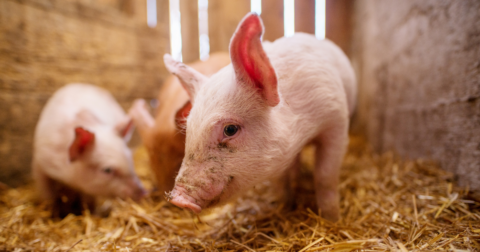News
A Major Agreement to Protect the Amazon Is Falling Apart After 20 Years
Climate•6 min read
Explainer
The last year saw policy fights play out on both the state and national level.


Words by Grace Hussain
On the law and policy front, 2023 has been an eventful year. What happened this year will undoubtedly have far-reaching implications in the world of animal policy, the health of the environment and livestock across the country. This year, animal issues were addressed by every branch and level of government. The Supreme Court sided with animal advocates twice this year, while the Biden administration dealt Alaskan wildlife a deadly blow with the approval of the Willow Project. Meanwhile, states attempted to erect barriers for cultivated meat.
Let’s take a look back at some of the most important animal policy stories of 2023, and what they might mean for the year ahead.
In May, the Supreme Court upheld California’s Proposition 12 — a ballot initiative that sought to ban gestation crates and other types of confinement for farm animals. Passed by 61 percent of voters in 2018, the bill was originally supposed to go into effect by 2022.
In a challenge brought by the National Pork Producers Council, pork industry plaintiffs argued that the bill violated the Constitution’s dormant commerce clause. In the end, the council’s appeal was denied and Prop 12 was upheld.
The national implications of Prop 12 for animal welfare are significant — which leads us to our next most-important animal policy story of 2023.
Just a few short weeks after the Supreme Court upheld Prop 12, Congressmembers from various agricultural states co-sponsored the reintroduction of the Ending Agricultural Trade Suppression Act (or EATS Act) as a way to overrule Prop 12 and prevent it from becoming law.
Touted as a policy to protect the economic interests of pork producers and other livestock farmers, the EATS Act would overrule any state law governing agricultural products. If enacted, the bill would prevent states from regulating everything from animal welfare to public health.
Animal rights activists in two separate trials were acquitted for taking animals from factory farms in 2022. In both cases, the activists rescued just a few sick animals that were of little economic value to farmers, a tactic called “open rescue.”
In 2023, Wayne Hsiung — a prominent activist in the movement — was found guilty of a felony in California for doing the same. Hsiung has said he plans to appeal the decision.
Despite protests and a lawsuit by climate groups, the Willow project — an oil drilling venture in Alaska — was approved in 2023 by the Biden Administration to move forward. Over a period of 30 years, the Willow oil project is expected to produce as many as 600 billion barrels of oil, while releasing 277 million metric tons of carbon dioxide emissions.
Wildlife experts also say the Willow project threatens at least seven species of wildlife. Inevitable spills will hurt the local Alaskan wildlife, environmental advocates say, and barges required to haul oil could strike various species of whales and seals.
This year, 2023, marked the 50th anniversary of the Endangered Species Act’s passage. An integral part of conservation efforts in the United States, the Act protects species of flora and fauna that are listed as endangered or threatened. On top of guidelines relating to the species themselves, the ESA also offers protections for “critical habitats,” which would struggle to survive without these provisions.
Even though several protected species have been brought back from the brink — bald eagle, humpback whale and black-footed ferret among them — the law has long been steeped in controversy. Some developers and landowners argue that the law creates barriers to growth, while a number of conservationists argue that the law doesn’t do enough, as many species go extinct despite their protected status.
Lawmakers in two states passed legislation to restrict sales of alternative proteins. In Florida, Republican lawmaker Tyler Sirois introduced a bill in the house that, if enacted, would ban cultivated meat from being sold in the state. Meanwhile, a measure in Texas that would effectively ban cell-cultured meat by demanding excessive legal e and labeling requirements was challenged by Tofurky in September. The lawsuit is still pending.
So-called Ag-gag laws, laws that criminalize undercover investigations on factory farms, continued to fail on First Amendment grounds in 2023.. North Carolina’s version was struck down by two courts — a U.S. district court and 4th Circuit Court of Appeals — before the Supreme Court declined to hear the case, leaving the lower courts’ decision to stand.
Over the past year, animal issues were addressed at every level of government. These key decisions and discussions will likely have lasting impacts on animal policy in the years ahead. We can expect more debate to come — as lawmakers and lawyers continue to argue and negotiate where society lands on open rescue, cultivated meat and the treatment of animals on factory farms.